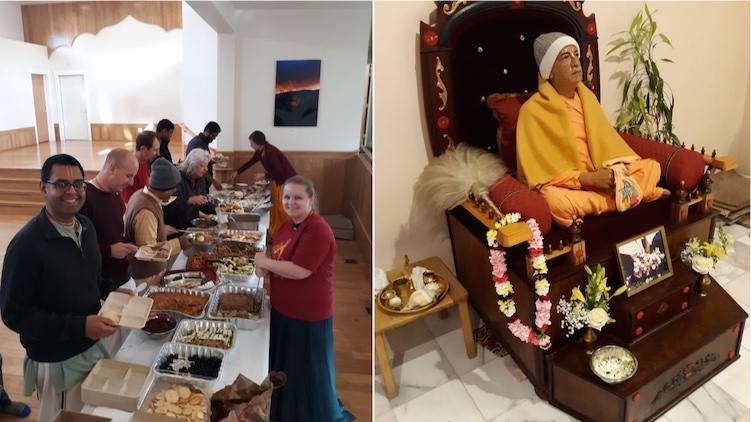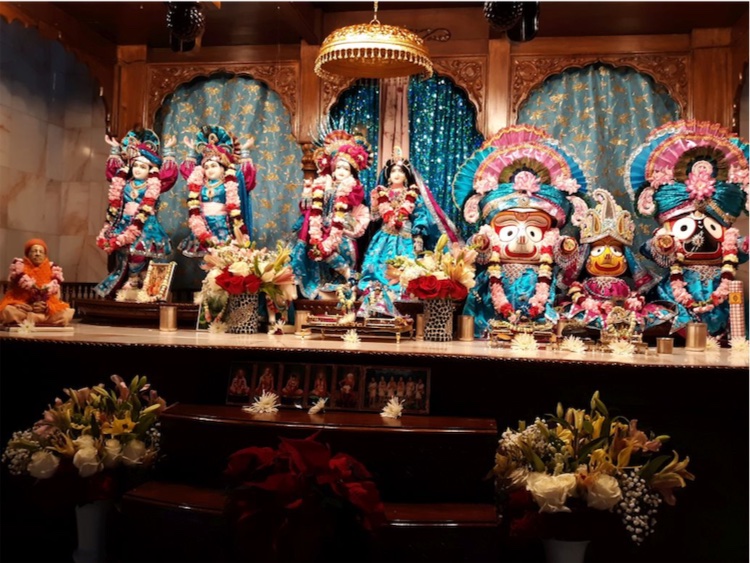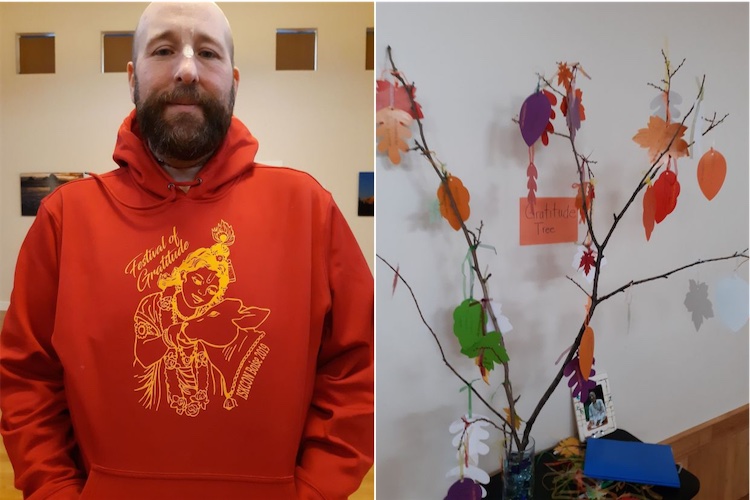Boise’s Festival of Gratitude Gives Thanks to Srila Prabhupada
By Madhava Smullen | Дек 07, 2019

Over the Thanksgiving weekend, devotees at ISKCON Boise, Idaho launched a new annual “Festival of Gratitude” this year, with the motto: “Appreciating Deity, Devotee, Nama, Dhama, Bhagavatam.”
“We wanted to focus on inspiring gratitude for Srila Prabhupada and the processs that he’s given us,” says Bhakta Nathen Wanty, who came up with the idea for the festival and co-organized it. “And with the gratitude gained from attending this festival, we hoped devotees would become more enthusiastic to follow the process, and share it with others.”
While ISKCON Boise is a small community, a total of about 100 people attended the festival, which was co-organized by Sri Sri Radha Bankebihari pujari Anadi Radha Dasi, and endorsed by temple president Anantarupa Das.
Running from Thursday November 28th to Saturday the 30th, the event began on Thanksgiving Day at 2pm with a welcome, a two-hour kirtan, and a big Thanksgiving prasadam feast.
“Nathen Prabhu, his wife Alicia, as well as his mom, brother and two kids were in the kitchen for hours, while other devotees brought dishes from home too,” says Anadi Radha. The resulting spread included tofurkey, nutloaf, mashed potatoes and gravy, vegetables with cheese sauce, fruit salad, banana muffins, cherry pie, pumpkin pie, and apple pie.
The heart of the festival then took place on Friday and Saturday. Each day started off with the morning program featuring a class by Anantarupa Das appreciating Srila Prabhupada, and how he gifted Srimad-Bhagavatam to the world.
After breakfast, Radhika Ramana Das (Dr. Ravi Gupta), who grew up at ISKCON Boise and is now the Charles Redd Chair of Religious Studies at Utah State University, gave a seminar entitled “Appreciating Srimad Bhagavatam.”

Sri Sri Radha Bankebihari at ISKCON Boise, Idaho
Divided into two 2.5 hour sessions, the first day appreciated the Bhagavatam from an academic perspective. Radhika Ramana cited the many ways in which Srimad-Bhagavatam is culturally significant, such as how it has touched art, architecture, literature and more not only in India but worldwide; how it has remained relevant through different cultures and time periods; why its Sanskrit poetry and meters are special; and how it is one of the most commentated upon works with some sixty to ninety commentaries.
He also described how Srila Vyasadeva, the author of Srimad-Bhagavatam, had been lamenting even after writing so many Vedic scriptures. The sage Narada then explained to him that this was because he had not glorified the Supreme Personality of Godhead and devotional service. Thus Vyasadeva embarked on writing the Bhagavatam, which is considered the cream of all Vedic literature.
As the second verse of the work itself describes, “Completely rejecting all religious activities which are materially motivated, this Bhagavat Purana propounds the highest truth.”
“Radhika Ramana Prabhu explained how the pure souls qualified to read Bhagavatam do not simply reject such religious activity and material motives to read some austere, stoic scripture,” Anadi Radha says. “But they are doing so to taste and enjoy the seedless, skinless fruit of the Bhagavatam, which is always replenishing and neverending.”
Finally, Radhika Ramana emphasized the importance of Srila Prabhupada’s purports, which not only make the Bhagavat-Purana understandable by ordinary people in this age of Kali, but also contain the commentaries of all the previous acharyas.
With a solid base on what makes the Srimad-Bhagavatam so authoritative and special, the second part of the seminar, on Saturday, dived deeper into its sublime content.
Tying his talk to the festival’s themes, Radhika Ramana pointed out that many of the stories in the Bhagavatam show devotees going through different struggles and hardships; but they remain grateful to the Lord, and in so doing build a relationship with Him.
Can we have gratitude for Krishna and Srila Prabhupada not just when things are easy, but when times are tough, too? Radhika Ramana asked his audience, explaining that such challenges give us a chance to pray to Krishna for His mercy.
The Bhagavatam emphasizes the relationship between Krishna and his devotees, Radhika Ramana said. He then told the stories of Prahlad and Dhruva, who went through incredible hardships and remained devoted to the Lord. Ultimately, such devotees were able to control the Lord through their love, or bhakti, and this is the message of the Bhagavatam.
“Radhika Ramana concluded by saying that the Srimad-Bhagavatam is for everyone, no matter what level we’re at,” Nathen says. “Yes, we’re unqualified to read the Bhagavatam, and that’s exactly why we should read it – because it lifts us up and purifies us as we do.”
Besides the seminars, the Festival of Gratitude included kirtans every night, with a special three-hour kirtan on Friday especially advertised for and geared towards the public.
“Unlike some of the major festivals, we didn’t have any big name kirtaniyas – it was all local devotees leading,” Nathen says. “It was very simple and sweet, just coming together to chant the Holy Names.”

(left) Bhakta Nathen Wanty, who co-organized the Festival of Gratitude (right) the children created a ‘Gratitude Tree’ on which to write appreciations
Alongside the seminars, there were also kids’ activities with Nathen’s wife Alicia, which focused on reasons to be grateful for Srila Prabhupada. Children listened to the story of how Prabhupada held his own Rathayatra as a young boy, then brought it to the Western World. They then made Rathayatra posters, as well as a map of Srila Prabhupada’s sea voyage from Kolkata to New York City.
The children also created a Gratitude Tree, with leaves inscribed with the words “I am thankful for…” Throughout the festival, all the devotees filled them in with their appreciations and hung them on the tree.
On Saturday evening, the festival concluded with a “family fun night,” in which devotees read out the appreciations written on the leaves, had snacks, played Srimad-Bhagavatam charades, and discussed how grateful they were for each other.
Some of the things appreciated on the leaves included devotee association; Srila Prabhupada; the Festival of Gratitude and those who made it happen; family and friends; and the Boise Hare Krishna community.
After the festival, many devotees expressed that they felt more appreciation for Srila Prabhupada, the Srimad-Bhagavatam, and the process of devotional service, and more enthusiasm to become Krishna conscious and share it with others.
Radhika Ramana also praised the festival as being an important opportunity for devotees to relax, connect with each other and care for each other, when often during festivals devotees work hard to present Krishna consciousness to to others.
“This gives us the chance to fill our cups,” says Anadi Radha Dasi. “Then, we’ll feel more inspired to make a difference in other people’s lives too.”
The team behind Festival of Gratitude are encouraged enough by its success to continue it as an annual event. After focusing on the Srimad-Bhagavatam this year, next year they hope to emphasize another one of the five processes highlighted in their motto: “Appreciating Deity, Devotee, Nama, Dhama, Bhagavatam.”
These are derived from Chaitanya Charitamrita, Madhya-lila, 22.128: “One should associate with devotees, chant the holy name of the Lord, hear Srimad-Bhagavatam, reside at Mathura and worship the Deity with faith and veneration.”
“In the Northwest, we don’t have a lot of the big festivals that bring devotees together like those on the East Coast in places like New Vrindaban and Alachua,” Nathen says. “So we invite anyone who wants to come next year and participate in appreciating and offering gratitude to Srila Prabhupada.”
Keep up to date with the Festival of Gratitude here:
https://www.facebook.com/Festival-of-Gratitude-108648533905552/
Watch video of the full seminar by Radhika Ramana Das here:
Appreciating Srimad Bhagavatam Day 1:
https://www.facebook.com/108648533905552/videos/973512013018219/?modal=admin_todo_tour
Appreciating Srimad Bhagavatam Day 2:
https://www.facebook.com/108648533905552/videos/1693151220816437/?modal=admin_todo_tour















